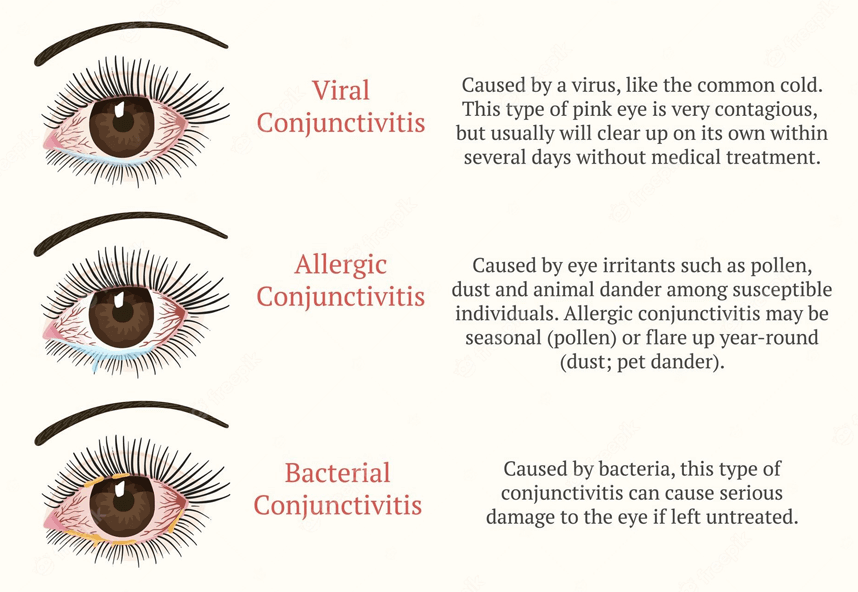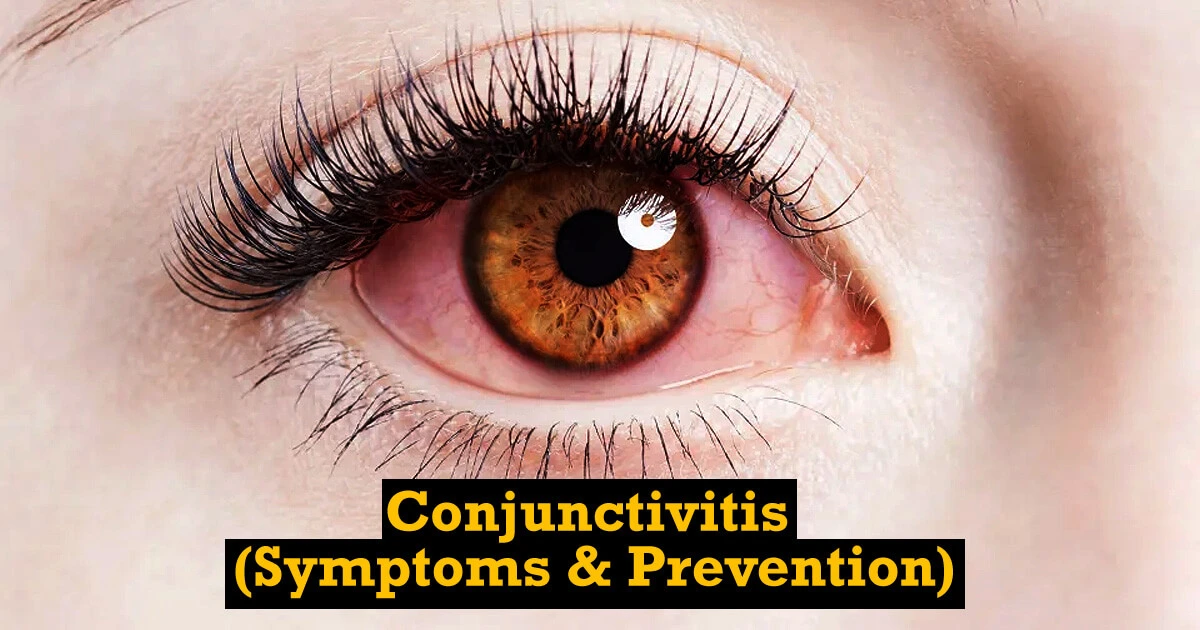Conjunctivitis is an inflammation or infection of the transparent membrane that lines the eyelid and eyeball. This membrane is called the conjunctiva. When small blood vessels in the conjunctiva become swollen and irritated, they’re more visible. This is what causes the whites of the eyes to appear reddish or pink. Conjunctivitis is also called the ‘Pink Eye.’ Conjunctivitis Pink Eye often becomes more prevalent during the monsoon season due to increased humidity and waterborne pathogens.
The incubation period (the time between becoming infected and symptoms appearing) for viral or bacterial conjunctivitis is about 24 to 72 hours.
ALSO READ- Stubborn Belly Fat- Possible Causes & Reasons
Conjunctivitis Pink Eye Symptoms
- Redness in the white of the eye(s) or inner eyelid.
- Itching, irritation, and/or burning in one or both eyes.
- Swelling of the conjunctiva (the thin layer that lines the white part of the eye and the inside of the eyelid) and/or eyelids.
- A thick yellow discharge in one or both eyes forms a crust of eyelids or lashes during the night that may prevent your eye(s) from opening in the morning.
- Green or white discharge (pus or mucus) from the eye(s).
- Sensitivity to light, called photophobia.
- Blurry or hazy vision.
- Increased tear production.
- Feeling like a foreign body is in the eye(s) or an urge to rub the eye(s).
- Swollen lymph nodes (often from a viral infection)Depending on the cause, other symptoms may occur.
ALSO READ- Bad Habits Affecting Skin & Making You Look Older
Conjunctivitis Pink Eye Causes
Causes of pink eye include:
- Viruses.
- Bacteria.
- Allergies.
- A chemical splash in the eye.
- A foreign object in the eye.
- Autoimmune conditions.
- Sexually transmitted infections
- In newborns, a blocked tear duct.

ALSO READ- Improve Digestion Naturally: 5 Best Tips
How Does Conjunctivitis Spread?
Allergic conjunctivitis is not contagious. Bacterial and viral conjunctivitis can easily spread from person to person.
- Direct contact (touching, shaking hands) with an infected person’s bodily fluids, usually through hand-to-eye contact.
- Direct transmission happens through droplets from the cough or sneeze of an infected person.
- Touching surfaces contaminated with bacteria or viruses then touching your eyes before washing your hands.
- Using old eye makeup or sharing makeup that’s contaminated with bacteria or viruses.
- Not cleaning contact lenses properly and also using poorly fitting contact lenses.
- Children are most likely to get pink eyes from bacteria or viruses as they don’t practice good hygiene. Also, they are in close contact with so many others in school or daycare centres.
It’s not an airborne disease, so it will not spread by looking at a person who has eye flu.
ALSO READ- Makeup Application Correct Order- Steps To Apply Products
How To Prevent Conjunctivitis Pink Eye?
Practice good hygiene and follow these tips so you will not infect other people or re-infect yourself.
- Avoid direct contact with anyone who has conjunctivitis.
- Wash your hands very often with soap and water. Make sure to wash them properly after touching communal objects, before eating, after you sneeze or cough and after using the bathroom.
- Do not touch your eyes with unwashed hands.
- Use a clean towel or tissue each time you wipe your face and eyes. Also, avoid sharing towels or washcloths.
- Change your pillowcases often.
- Avoid using eye makeup while your eyes are infected. Throw away old eye cosmetics, such as mascara. And never share eye makeup with others.
- Make sure to clean or replace your contact lenses exactly as your ophthalmologist recommends. Do not wear contact lenses until the conjunctivitis goes away. Wearing contact lenses when you have an eye infection may damage the cornea, the clear, outermost layer of the front part of the eye.
- To minimize exposure to conjunctivitis Pink eye, try to stay indoors during the peak of the monsoon season. If you must go outside, consider wearing protective eyewear like sunglasses to shield your eyes from dust and debris. Also, avoid going to heavily crowded places as that can become breeding grounds for infectious illnesses, including conjunctivitis.
ALSO READ- 6 Best Home Remedies To Treat Chikungunya
ADVICE
Though conjunctivitis can be irritating, it rarely affects your vision. But taking the right treatment on time can help ease the discomfort of pink eye. As this can be contagious, getting an early diagnosis and taking certain precautions can help limit its spread. Therefore if you experience any symptoms of conjunctivitis, consult a doctor promptly for proper diagnosis and treatment. Consume a healthy diet rich in minerals and vitamins, particularly vitamin A, to support your eyes’ natural defence against such eye infections. Also, to reduce crusting and soothe discomfort associated with conjunctivitis, apply warm compresses over closed eyes.
ALSO READ- Top 5 Healthy Foods To Treat CHIKUNGUNYA
